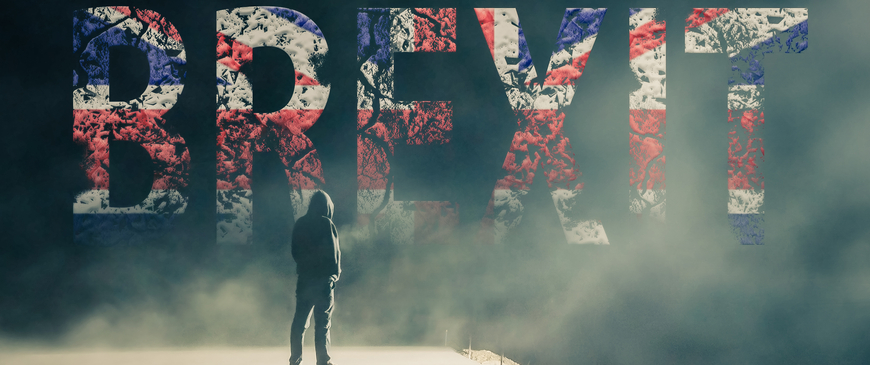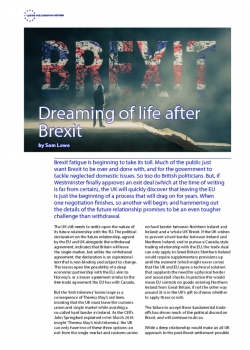
Dreaming of life after Brexit
The British public is growing tired of Brexit. But assuming something that looks like the withdrawal agreement is signed off, what comes next?
Brexit fatigue is beginning to take its toll. Much of the public just want Brexit to be over and done with, and for the government to tackle neglected domestic issues. So too do British politicians. But, if Westminster finally approves an exit deal (which at the time of writing is far from certain), the UK will quickly discover that leaving the EU is just the beginning of a process that will drag on for years. When one negotiation finishes, so another will begin; and hammering out the details of the future relationship promises to be an even tougher challenge than withdrawal.
The UK still needs to settle upon the nature of its future relationship with the EU.
The UK still needs to settle upon the nature of its future relationship with the EU. The political declaration on the future relationship, agreed by the EU and UK alongside the withdrawal agreement, indicates that Britain will leave the single market, but unlike the withdrawal agreement, the declaration is an aspirational text that is non-binding and subject to change. This leaves open the possibility of a deep economic partnership with the EU, akin to Norway’s, or a looser agreement similar to the free trade agreement the EU has with Canada.
But the ‘Irish trilemma’ looms large as a consequence of Theresa May’s red lines, insisting that the UK must leave the customs union and single market while avoiding a so-called hard border in Ireland. As the CER’s John Springford explained in his March 2018 insight ‘Theresa May’s Irish trilemma’, the UK can only have two of these three options: an exit from the single market and customs union; no hard border between Northern Ireland and Ireland; and a ‘whole UK’ Brexit. If the UK wishes to prevent a hard border between Ireland and Northern Ireland, and to pursue a Canada-style trading relationship with the EU, the trade deal can only apply to Great Britain; Northern Ireland would require supplementary provisions up until the moment (which might never come) that the UK and EU agree a technical solution that supplants the need for a physical border and associated checks. In practice this would mean EU controls on goods entering Northern Ireland from Great Britain, if not the other way around (it is in the UK’s gift to choose whether to apply these or not).
The failure to accept these fundamental trade-offs has driven much of the political discord on Brexit, and will continue to do so.
While a deep relationship would make an all-UK approach to the post-Brexit settlement possible – and would be in the UK’s economic interest – it would curtail the UK’s ability to pursue its own trade agreements with the US and others. Remaining in a customs union with the EU, for example, would not, as some argue, prevent the UK from operating its own independent trade policy. Britain would still need to negotiate its access to new markets, and have free rein in areas such as services, intellectually property, procurement and data. But it would not be able to lower or remove tariffs unilaterally. Alignment with EU agri-food regulations (which would be required to keep the Irish border open) would also make it near-impossible for Britain to concede to US demands to accept food imports produced to American standards.
If the UK eventually passes the withdrawal agreement, other trade negotiations with the likes of Australia and New Zealand will probably start – to much fanfare – soon after the transition period begins, but little progress will be made until the final nature of the UK-EU relationship is determined. In practice, the majority of civil service time and effort will continue to be spent on the arduous process of replacing the 40 or so trade agreements the UK currently has by virtue of its EU membership.
The UK will probably, at least initially, continue its quest to find a half-way house that delivers both an independent trade policy and an all-UK approach to Northern Ireland. The prime minister’s Chequers proposal of July 2018 proposed a framework in which the UK would be able to adjust its own tariffs while retaining the benefits of being in a customs union and de facto the single market for goods. Such flexibility is probably not on offer from the EU. The closest the UK could get is a full-blown customs union, which could potentially be supplemented with measures mitigating the need for checks at the border, if not ruling them out entirely.
For if the UK is to go further, be it a customs union plus the single market in goods (the option we dubbed ‘Jersey’ in our January 2018 bulletin article ‘Holding out hope for a half-way Brexit house’), or the single market in its entirety, inclusive of services, it will need to roll back its ambitions for a fully independent trade policy and, more importantly, compromise on freedom of movement. Services have largely been left out of the Brexit debate (with the exception of financial services), but as discussions on the future progress they will come to the fore. And, as argued in my December 2018 policy brief ‘Brexit and services: How deep can the UK-EU relationship go?’, if the UK is to leave the single market, and curtail freedom of movement, it should not expect much in the way of services access to the EU, beyond what is offered to the rest of the world.
In reality, the UK’s political classes will continue to be at war with themselves for some time.
Politically, none of these choices will be easy for the UK. Following Brexit, and assuming a withdrawal deal passes, there will probably be a lull in the negotiations as the EU elects a new Parliament and Commission. This gives the UK time, theoretically, to decide what it wants to achieve with the negotiations and come up with an appropriate strategy, given the EU’s stated opposition to the cherry-picking of the four freedoms. But in reality, the UK’s political classes will continue to be at war with themselves for some time. Another attempt by Brexiters to topple Theresa May is probable, and a general election possible. If there were to be a new government, the process of deciding on a desirable end-state would begin all over again. Much like the Article 50 process, a substantive conclusion is unlikely to be in sight until the end of the transition period in December 2020. An extension to the transition, if only to implement whatever deal is agreed – or to facilitate further negotiations – already seems inevitable.
If the UK and EU are wise, no matter the depth of the initial economic relationship, they will put in place an overarching institutional structure that allows for continued review, negotiation, updates and tweaks. Otherwise, as in the case of the EU and Switzerland, every change in domestic public sentiment will see the start of fresh negotiations, and renewed banging of heads.
The future negotiations require the UK to make decisions on Northern Ireland, and on whether to prioritise existing deep economic ties with the EU over potential new deals with the US
and major emerging economies. The UK will also have to consider whether it wants to sacrifice its existing services market access solely for the purpose of curtailing freedom of movement. There is little in the current political debate to suggest that the UK is ready to make these choices yet, nor that it will be ready any time soon.
Sam Lowe is a senior research fellow at the Centre for European Reform.

